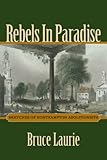
View on Amazon
In our historical recollection, the American public tends to generalize about the north and the south in the years leading up to the civil war. In our minds, the north was abolitionist, and the south was a monolith for the preservation of slavery. Among this culture of broad generalizations, professor of history at the University of Massachusetts Amherst, Bruce Laurie takes this opportunity to examine a very specific group abolitionists in Northampton, Massachusetts.
In his book, Rebels In Paradise; Sketches of Northampton Abolitionists (University of Massachusetts Press, 2015), Bruce Laurie examines five individuals who had a profound effect on the abolitionist cause in western Massachusetts. He characterizes the movement in antebellum Northampton as a community so "robust" that it eventually became "a major stop on the Underground Railroad".
In a biographical tone, Professor Laurie outlines the lives of these 5 abolitionist individuals and explains each one's unique vantage point. A man named David Ruggles, the only African American outlined in his book, provided an African American prospective for a relatively small black community in Western Massachusetts. Another influential figure, Sylvester Judd was the cynical realist of the group.
Bruce Laurie expertly examines each one of these characters and successfully demonstrates how they contributed to the abolitionist community, and ultimately, cemented Northampton's place as a vivid and blooming center for anti-slavery movements.





